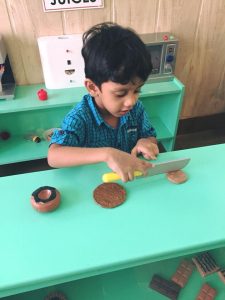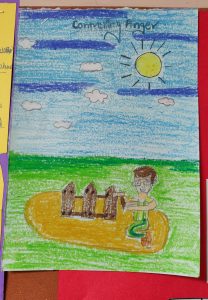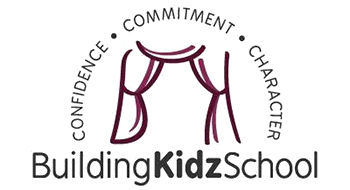“I hear, and I forget
I see, and I remember
I do, and I understand.”
– Confucius
Yes! That pretty much sums up learning, especially for little munchkins who have just started playschool. A child learns best by doing, through experiential learning.
Ah! The joys of childhood! Getting smeared in dirt, chasing butterflies, learning numbers by counting the pieces of fruit loops in the plate.
Play comes easy to kids. They are natural born-players and learn best through discovery. We just need to watch a toddler for a while to get it.
Sadly, it all vanishes as a 2-year-old joins a school. They now spend the better part of the time at school in a passive learning environment.
 Now, envision this … a happy and bustling place … a small girl is running around and spinning a tale as she plays – an imaginary story of a young princess imprisoned in a dungeon. The little girl becomes the princess in her musings and imagines her character, her feelings, her friends who came to help her, and finally how she bravely escapes. Now, stop and observe this scenario more closely … the little girl is living the character in her tale, no doubt, but she is doing so much more. Spinning stories in a make-believe world is also teaching the kid about story plot, sequencing (beginning, middle, and end) and character building, etc. This is experiential learning. Learning by doing.
Now, envision this … a happy and bustling place … a small girl is running around and spinning a tale as she plays – an imaginary story of a young princess imprisoned in a dungeon. The little girl becomes the princess in her musings and imagines her character, her feelings, her friends who came to help her, and finally how she bravely escapes. Now, stop and observe this scenario more closely … the little girl is living the character in her tale, no doubt, but she is doing so much more. Spinning stories in a make-believe world is also teaching the kid about story plot, sequencing (beginning, middle, and end) and character building, etc. This is experiential learning. Learning by doing.
Now, let’s take another scenario – that of a bunch of kids dressed up as astronauts and building a rocket ship from a cardboard box, making propellers out of cardboard and pretending to be all set for the launch. Again, the kids are understanding by doing. They are experiencing and therefore connecting, and as a result, learning.
A much more exciting and meaningful way to learn about astronauts and rockets then merely reading about them in a textbook, right?
Don’t the above two scenarios tell of a happier way of learning? An engaging and stimulating way, rather than the dull and self-limiting way of textbook and rote learning?
Also, role-play kindles the kids’ logical and creative abilities and inspires them to create whole new possibilities for themselves.
| Learning is not limited to academics alone. It is also about life skills and has even more relevance in the early years when children begin exploring the world around them. |
How Does Experiential Learning Help Young Kids?
We see a lot of angry, edgy and restless kids these days. Ever wondered why?
Anger, impatience, stress, and competitiveness surrounds us, and we are passing it on to our kids.
To break this alarming trend, we must look for ways to help the kids be calm and relaxed.
 A way that makes them centered, creative, reflective and proactive. A playful and engaging way that helps them to not just cope with the environment they are thrown in but thrive in it.
A way that makes them centered, creative, reflective and proactive. A playful and engaging way that helps them to not just cope with the environment they are thrown in but thrive in it.
Numerous studies have firmly established the life-changing power of taking learning beyond the classroom and textbooks and engaging in real-life experiences.
| 70% of what we know comes from experience and trying new things. |
Experiencing – playing, exploring, discovering, creating and engaging with the world around you is the foolproof way of inducing meaningful and lifelong learning. Even more so in the highly impressionable early years of a child.
Having said that, it doesn’t mean kids don’t need structure, or that academic skills are not essential. It is necessary to recognize that early childhood education needs to be developed in a way that it sparks young minds and draws them to learning.
Here’s How experiential learning make a positive impact in the life of a preschooler
- A super fun way for kids to go on a journey of self-discovery at their own pace.
- Kids are not passive receivers but are thoroughly involved in the activity with lots of enthusiasm and curiosity.
- It recognizes the fact that no two children are alike and supports the spirit of individuality in each child.
- Experiential learning respects and values each child’s areas of strength, interest, and weakness and encourages them to find their own North!
- It uses real-life situations to motivate young children to think critically about abstract concepts. For example, kids can learn simple additions through a small role play of sabzi mandi; or understand the role of an ambulance by creating a real-life hospital atmosphere where kids learn hands-on.
- It is a collaborative way of learning and enables kids to work out their own unique strategy as there are no ‘right’ or ‘wrong’ answers in an experiential setup.
- Reflection is an integral part of the learning process and helps the kids understand the whys, how and why not of a given activity. The real-life experience of the activity helps the kids make a stronger connection, analyze and understand better.
- Teaches kids valuable life skills – how to be assertive, social, leaders, team players; how to solve conflicts, and much more. All this is done through role-play and using the playground to mimic real-life situations.
3-4-year-olds are curious cookies, with a delightful and inexhaustible desire to get answers for their endless questions. They need patience and a loving atmosphere that supports their tireless quest for knowledge.
They need empathetic and enthusiastic mentors, be it parents or educators, who understand this need and are committed to creating a loving and stimulating learning environment to enable their holistic development.
To sum up, as Oliver Wendell Holmes Jr. said, “A mind that is stretched by a new experience can never go back to its old dimensions.”
So, the next time you see your little one having an animated conversation with her/his beloved stuffed toy or seemingly making a mess with poster colors in the loo, let her/him be. They are more than likely learning and blossoming, exactly as they should be!
